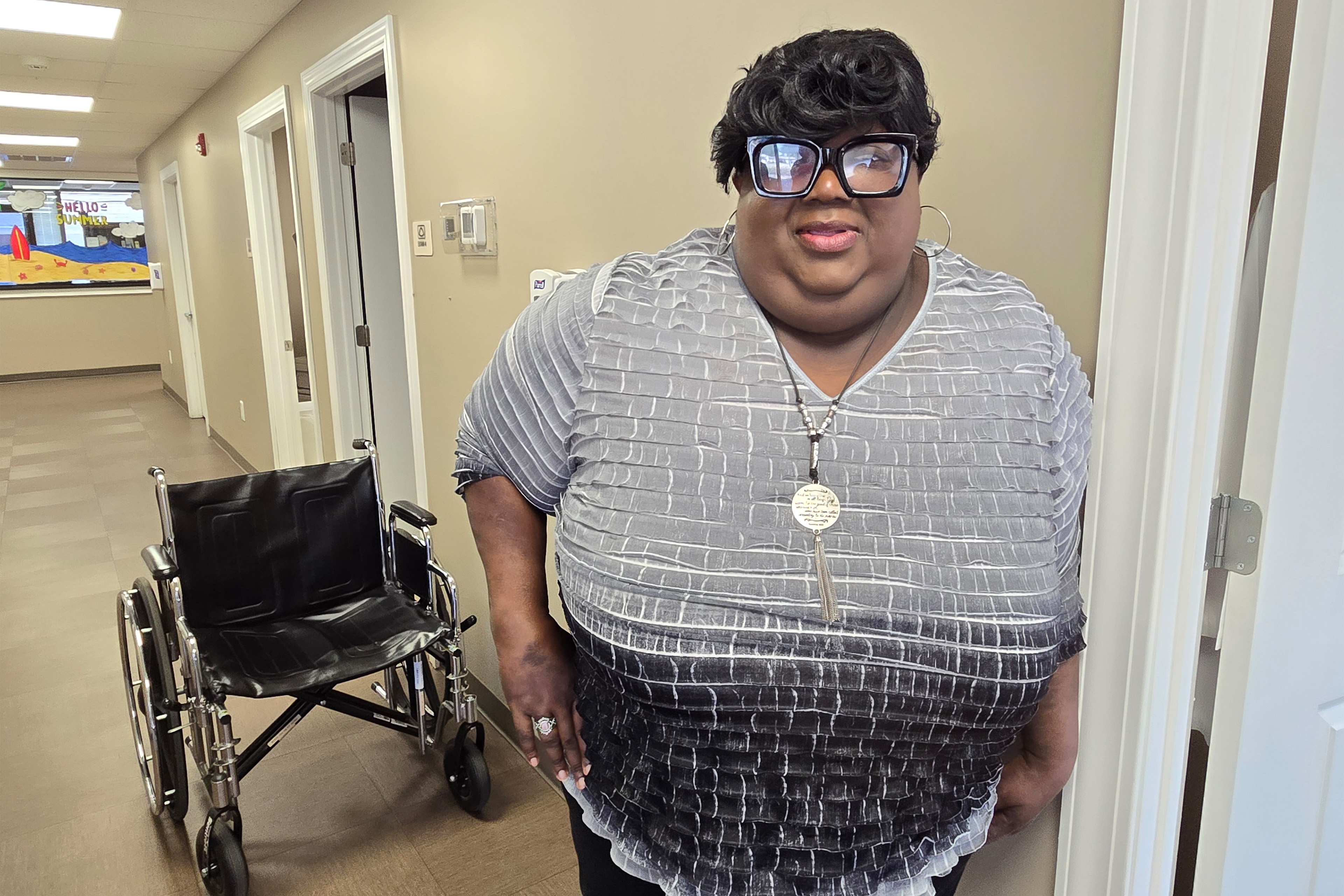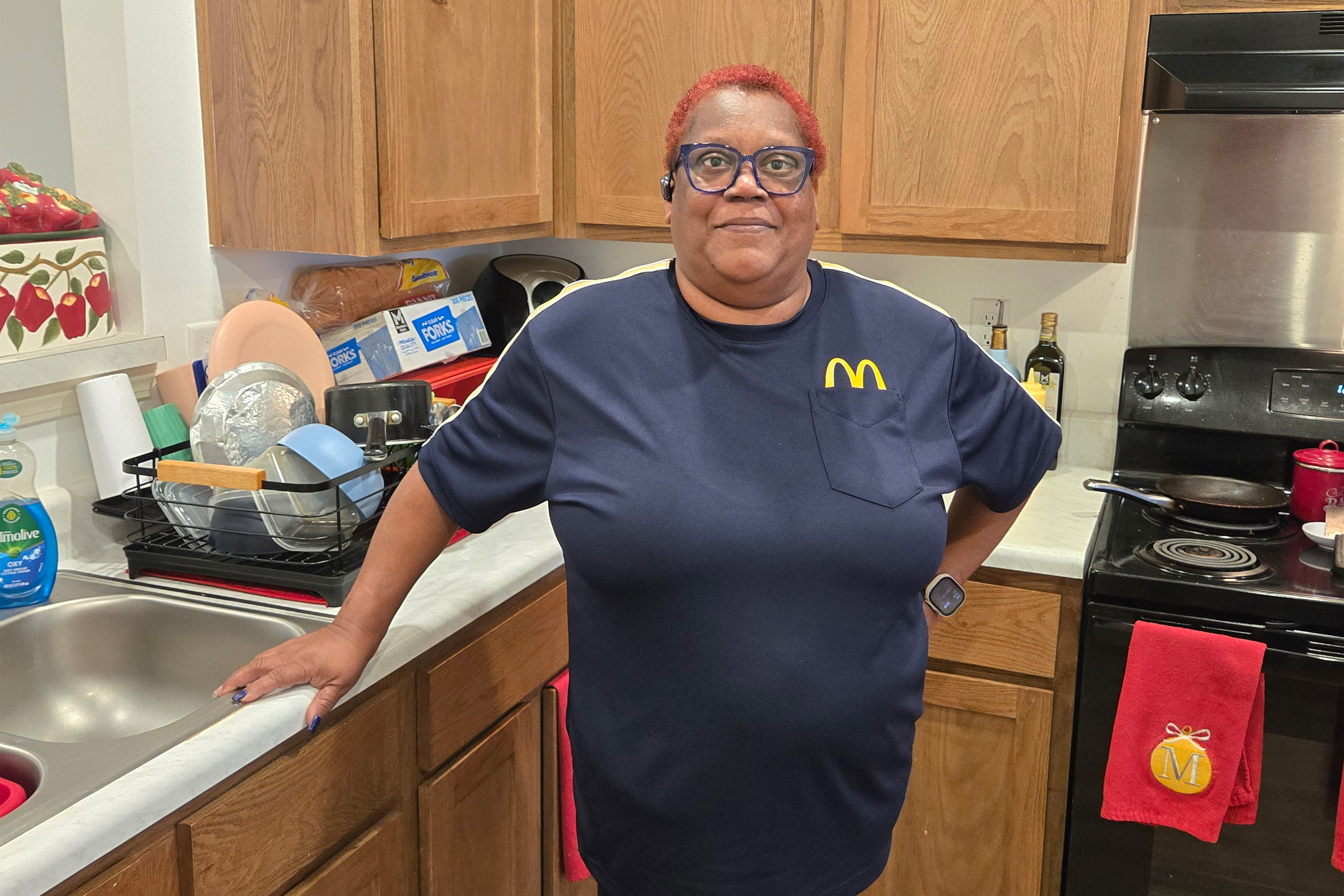
COLUMBUS, Miss. — April Hines has battled with her weight since she was a teenager.
But in the past couple of years, she’s fallen from 600 pounds to 385, and her blood pressure and blood sugar levels are down, too. “I’m not as fatigued as I used to be, and I’ve been able to go back to church,” she said.
Hines, 46, credits her weight loss to Trulicity, part of a new class of expensive weight loss drugs known as GLP-1s, and her Medicaid coverage for it. “It’s a blessing,” she said.
In a state where the obesity rate ranks among the highest in the country, many health providers were thrilled when Mississippi Medicaid in 2023 began covering GLP-1s for people 12 and older. Only 13 states cover the drugs for Medicaid enrollees for obesity, and Mississippi’s Medicaid program typically has some of the sparsest benefits and strictest eligibility rules.
Hines is one of relatively few enrollees to have used the new Medicaid benefit, which weight loss doctors in the state say has been hindered by national drug shortages, the state’s prior authorization process for the drugs, and a lack of marketing. Just 2% of adults on Mississippi Medicaid who meet the weight-related criteria had been prescribed a GLP-1 as of December 2024, according to a report to the state’s Medicaid Drug Utilization Review Board.
“It’s a little sad to have so many people out there not benefiting,” said William Rosenblatt, a family doctor in Columbus who treats Hines. “These drugs get to the root cause of so many health conditions.”

Already-scarce Medicaid coverage of the highly touted weight loss drugs could become more limited, with federal Medicaid funding cuts expected in the wake of the massive tax-and-spending bill President Donald Trump signed into law in July. The Congressional Budget Office estimated that the law would reduce Medicaid spending by about $911 billion over a decade.
“The law is going to create fairly intense pressure on states not to expand benefits,” said Michael Kolber, a partner in the health consulting firm Manatt. That may be especially true for these drugs, which often cost around $1,000 a month and could be used by a large percentage of Medicaid recipients, he said.
Subscribe to KFF Health News’ free Morning Briefing.
GLP-1s, which have been used for years to treat Type 2 diabetes, have gained widespread attention as a way to lose weight and reduce obesity-related conditions and their long-term costs.
But states may remain reluctant to offer the expensive drugs for obesity, because Medicaid recipients frequently churn on and off the coverage as their income changes. And because the drugs’ health benefits may take years to materialize — such as averting a future heart attack — the long-term financial advantages could accrue to other insurers.
Even ahead of the federal cuts, which will largely take effect in 2027, states are already feeling the pinch. North Carolina’s Medicaid program dropped its coverage of the drugs this month, citing their high cost.
Coverage for the weight loss drugs presents a dilemma for the Trump administration, which has identified as priorities attacking chronic health conditions and reducing federal spending. Health and Human Services Secretary Robert F. Kennedy Jr. has downplayed the need for the drugs and said more emphasis should be placed on eating better and exercising more.
In 2024, the Biden administration proposed that Medicare and Medicaid cover weight loss drugs to help tackle obesity as a public health crisis. In April, the Trump administration revoked the Biden-era proposal, saying the programs would not cover GLP-1 drugs for weight loss.
But in August, The Washington Post reported the Trump administration was considering a five-year pilot program for Medicare and Medicaid to cover the drugs after all. No details have been released. Asked for comment on the report, Centers for Medicare & Medicaid Services spokesman Alexx Pons told KFF Health News that all decisions go through a cost-benefit review.
Meanwhile, the Trump administration has included the GLP-1 drugs Ozempic, Wegovy, and Rybelsus on its list of 15 medicines that will be subject to price negotiations with pharmaceutical manufacturers under its Medicare Part D program, a system created during the Biden administration amid opposition from Republicans. The results of those negotiations are expected to be announced this fall.
Most private insurers don’t cover GLP-1s for weight loss, which can make the drugs unaffordable for those paying out of pocket.

Further analysis provided to Mississippi’s Medicaid drug review board shows that, in the first 15 months the drugs were covered, only about 2,900 Medicaid enrollees age 12 or older started treatment. Nearly 90% of them were female, and many had high blood pressure and high cholesterol.
The analysis also found most enrollees using the drugs lived in the southern, central, or northern parts of Mississippi — not along the Mississippi Delta on the western side of the state, where obesity rates are highest, at nearly 50%.
About 40% of adults in Mississippi are obese, just one percentage point behind top-ranked West Virginia, according to federal data.
Mississippi Medicaid spokesman Matt Westerfield told KFF Health News that the state spent $12 million in the first 15 months, providing the weight loss drugs to 2,200 adult members. He said the state approved the new drugs on the logic that treating obesity would improve enrollees’ health and eventually could lead to cost savings by reducing diseases caused by obesity.
Westerfield said that while utilization has been below the state’s projections, such treatment decisions are up to patients and their doctors. He said the state has been “raising awareness” of the drugs among health care providers, but he declined to comment further.
Rosenblatt, who works for Baptist Medical Group, part of a large regional health system, said some doctors have less incentive to prescribe the medicine, because the state doesn’t pay them to counsel patients about necessary dietary changes when taking the new drugs.
He called the drugs “game changers,” adding that he has seen patients lose 50 pounds or more within a few months of starting the drugs and no longer need medications for diabetes or other conditions.
A New England Journal of Medicine study published in 2021 found participants receiving GLP-1 drugs were more likely to show significant, sustained weight loss compared with those getting a placebo.
Other recent studies have shown the drugs help people with obesity lower their high blood pressure and reduce their odds of heart attacks or strokes.
Mississippi is one of 10 states that have not expanded Medicaid eligibility under the 2010 Affordable Care Act to everyone with an income under 138% of federal poverty level, or $21,597 this year.
In Mississippi, Medicaid does not cover adults without dependent children. Parents qualify only if their income is below 22% of the federal poverty level, or $5,863 for a family of three this year.
The state’s prior authorization process requires doctors to document to the state that patients meet certain obesity levels and that a treatment plan is in place. Doctors must demonstrate that enrollees are losing weight every six months to renew their prescription.
At the Hattiesburg Clinic — a large, multi-specialty group with a location in Hattiesburg, Mississippi — Virginia Crawford, a physician who specializes in obesity, said she was surprised so few patients are getting the drugs. A year ago, there were shortages of the drugs that could have curtailed physicians prescribing them. And she said the state’s prior authorization requirements for the drug could discourage primary care doctors. Many common medications do not require progress reports or even prior authorization.
“We need to make patients more aware that this option is available for them,” she said.
Lauren Scott, 40, of Laurel, Mississippi, said that with the help of Medicaid coverage, she lost nearly 100 pounds taking Wegovy.
“It’s just been amazing,” she said of how the drug drastically cut her appetite. “I remember going to Outback with my husband, and we got the onion ring appetizer and 16-ounce ribeye and salad with extra ranch dressing. I had some onion rings and started on the salad and realized I could not eat any more of this.”

KFF Health News is a national newsroom that produces in-depth journalism about health issues and is one of the core operating programs at KFF—an independent source of health policy research, polling, and journalism. Learn more about KFF.

Lorem ipsum dolor sit amet, consectetur adipiscing elit. Ut elit tellus, luctus nec ullamcorper mattis, pulvinar dapibus leo.
Lorem ipsum dolor sit amet, consectetur adipiscing elit. Ut elit tellus, luctus nec ullamcorper mattis, pulvinar dapibus leo.